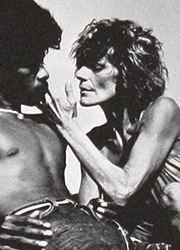Friday, June 3, 1988.
A WINTER TAN. Music by Ahmed Hassan and John Lang. Based on the 1979 memoir Give Sorrow Words: Maryse Holder's Letters from Mexico. Co-written and directed by Jackie Burroughs. Produced and co-directed by Louise Clark. Photographed and co-directed by John Walker. Sound recorded and co-directed by Aerlyn Weissman. Co-directed by John Frizzell. Running time: 93 minutes. Restricted entertainment with the B.C. Classifier's warning: frequent very coarse and suggestive language, occasional nudity.
IT TELLS US SOMETHING about national stereotypes. When Maryse Holder (Jackie Burroughs), an aging New York teacher and self-proclaimed feminist, craves escape, her choices are Mexico and Canada.
Because she's seeking total release — intellectual, sensual, social and sexual — she chooses to binge out in Mexico.
If her choice were Canada, she writes to her friend Edith Jones (Diane D'Aquila), she could "become a recluse, a dignified writer." Mexico, by contrast, offers A Winter Tan.
Such notions are not new. Reclusive Malcolm Lowry came to Canada to write. He produced Under the Volcano, the story of an Englishman's Mexican binge.
Nor are binges particularly new. In the past year [1987], filmgoers have been offered at least two involving alcohol (in Barfly and Ironweed). What distinguishes Holder's tale is its emphasis on sex.
"My writing's unpublishable anyway," she says. " . . . kvetching out an entire novel from banal sexual encounters."
Holder detailed her encounters in "well over a thousand pages of letters." Following her murder in 1977, Jones organized her obsessive epistles into a book, Give Sorrow Words, published by Grove Press in 1979.
Moved by the character that emerged from Holder's overblown, self-examining, often self-indulgent prose, actress Burroughs fashioned her letters into a screenplay. Together with fellow Canadians Louise Clark, John Walker, Aerlyn Weissman and John Frizzell, she went on location in Mexico to co-direct A Winter Tan.
It's not a pretty picture. Filmed in docudrama style, it consists largely of Burroughs addressing the camera as if it were Jones, confiding her thoughts, attempting to make sense of her feelings and offering explicit word pictures of her experiences.
Perhaps the hydra-headed directorial team saw Holder as a kind of female Henry Miller, an uncompromising adventurer at large in Acapulco, conducting her own personal "research into passion."
Perhaps there is some point to the fact that it all ends tragically.
Perhaps it is no more than a showcase for the raging, adventuresome, irrepressible Burroughs, one of Canada's most honoured actresses. Her all-stops-out performance constitutes an acting binge of uncommon dedication and intensity.
Unfortunately, her performance is at the centre of a picture with nothing new or particularly insightful to say. Holder, as portrayed, comes across as an angry, terminally self-destructive flake, a woman whose experiences, however pitiable, add little to our understanding of either obsessive lust or the feminine mystique.
A Winter Tan offers little more than 90 minutes with a nattering nut.
The above is a restored version of a Province review by Michael Walsh originally published in 1988. For additional information on this archived material, please visit my FAQ.
Afterword: At the 1989 Genie Awards, the major contenders were A Winter Tan (with seven nominations) and director David Cronenberg's Dead Ringers (13 nominations). Though Cronenberg triumphed (with 11 wins, including best picture), Jackie Burroughs was the Canadian Academy's choice for best actress, her third win (of six Genie acting nominations during her four-decade feature-film career). Her first win was for her performance in 1982's The Grey Fox, director Philip Borsos's made-in-B.C. tale of a legendary Canadian train robber. She worked with Cronenberg the next year in his adaptation of Steven King's The Dead Zone. Her performance as Hetty King, the schoolteacher who takes in her niece Sara Stanley (played by Sarah Polley) on the seven-season TV series Road to Avonlea (1990-1996), made her a Canadian icon. The role brought her the first of her four best actress Gemini awards. She died in 2010 at the age of 71, one week after the premiere of her final feature film, Small Town Murder Songs, at the Toronto International Film Festival.
